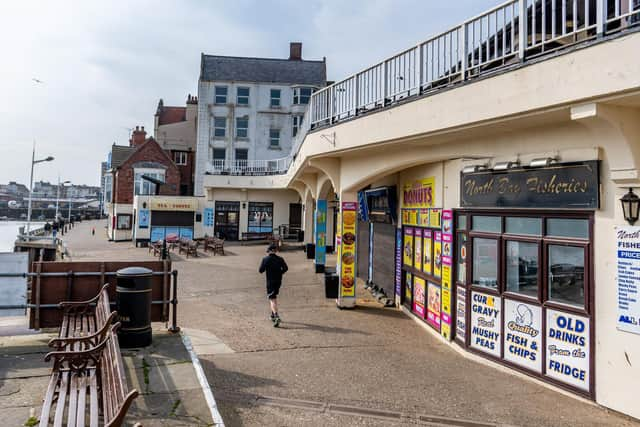Going for a walk is a social activity – not an antisocial one – David Behrens


The number of footsteps I take, and the time and distance I have covered, have assumed a significance out of all proportion to almost everything else. That’s what happens when your normal routine goes out of the window – perspective goes with it.
The irony is that when I’ve been told in the past to get as much exercise as possible, I’ve preferred to stay indoors. Now the very opposite is true. The moment something is restricted it acquires a certain mystique.
Advertisement
Hide AdAdvertisement
Hide AdGoing out for a walk has become a curiously clandestine activity. I get the distinct impression that my presence is unwelcome – and that is despite the official guidance that a taking a daily stroll of indeterminate length is still permissible.


It is especially true on the many public footpaths that encircle my house. Several now have pieces of paper stuck to the stiles, warning against touching them – the implication being that I should not have come near in the first place.
Other walkers I meet – some of whom appear even less used to taking exercise than I – seem to be of a similar mindset. We give each other a wide berth and if we converse, we do so from a distance. More likely, we just exchange guilty glances.
Advertisement
Hide AdAdvertisement
Hide AdBut there is an unpleasant undercurrent. A new code has emerged on when or if one should be out of doors, and a breed of self-appointed vigilante has emerged to enforce it.
Those notes on the stiles were civil compared to the one that a woman in Leeds found on her car windscreen this week. “I have recorded your registration number,” it read. “You have no business in this street. You have broken the quarantine regulation lockdown.”
The lady in question was not engaged in idle exercise, but was delivering food to vulnerable residents and had parked her car outside the home of one of them. So she had more business being out than the person who left the note.
Advertisement
Hide AdAdvertisement
Hide AdIt is seldom helpful to take such a blinkered view, and less still to take the law into your own hands. The restrictions on movement have been imposed more than anything to enforce common sense. Without them there would be no practical way of keeping a safe distance from the next person.
But common sense also dictates that fighting off atrophy by going for a walk every day ought not to induce guilt. The virus, after all, does not thrive outdoors – just in enclosed spaces, we are told.
We now have three more weeks of this, so we’re going to have to learn to dispel this cloud of suspicion and to co-exist with each other more happily.
Advertisement
Hide AdAdvertisement
Hide AdBut what then? It is becoming clear that our exit strategy from isolation will involve subtle and perhaps permanent changes in the way we interact with each other. Our natural inclination may be to pile en masse into the nearest Wetherspoons the moment the lockdown is lifted, but the reality will be more muted. We will not be allowed the “brief period of rejoicing” to which Churchill referred on VE Day exactly 75 years earlier, but will instead enter a state of uncertainty in which we re-engineer the rules of social engagement. The casual handshake, a gesture so routine we seldom even consider it, will become as abhorrent as sneezing on someone.
We have adjusted to our changing circumstances better than we could have imagined three weeks ago. What was extraordinary then is normal now, and we will take future adjustments in our stride, so long as that layer of common sense is maintained.
We will become used to a continuing curtailment of our freedom of movement, even when getting on a bus or train has been reintroduced. Hospitals, care homes and those other enclosures in which the virus thrives, will remain mostly out of bounds.
But as Mark Woolhouse, professor of infectious diseases at Edinburgh University, said this week, “if people get out of their house, into their car, drive to a park, do their business with social distancing in mind, and then come back”, then the risks are very low. That is the proper perspective.
Advertisement
Hide AdAdvertisement
Hide AdIn my case I am driven to exercise because the weather has been pleasant and I have less than usual to do. It is a social activity, not an anti-social one. The same cannot be said for leaving curt notes to each other.
Editor’s note: first and foremost - and rarely have I written down these words with more sincerity - I hope this finds you well.
Almost certainly you are here because you value the quality and the integrity of the journalism produced by The Yorkshire Post’s journalists - almost all of which live alongside you in Yorkshire, spending the wages they earn with Yorkshire businesses - who last year took this title to the industry watchdog’s Most Trusted Newspaper in Britain accolade.
And that is why I must make an urgent request of you: as advertising revenue declines, your support becomes evermore crucial to the maintenance of the journalistic standards expected of The Yorkshire Post. If you can, safely, please buy a paper or take up a subscription. We want to continue to make you proud of Yorkshire’s National Newspaper but we are going to need your help.
Advertisement
Hide AdAdvertisement
Hide AdPostal subscription copies can be ordered by calling 0330 4030066 or by emailing [email protected]. Vouchers, to be exchanged at retail sales outlets - our newsagents need you, too - can be subscribed to by contacting subscriptions on 0330 1235950 or by visiting www.localsubsplus.co.uk where you should select The Yorkshire Post from the list of titles available.
If you want to help right now, download our tablet app from the App / Play Stores. Every contribution you make helps to provide this county with the best regional journalism in the country.
Sincerely. Thank you.
James Mitchinson, Editor